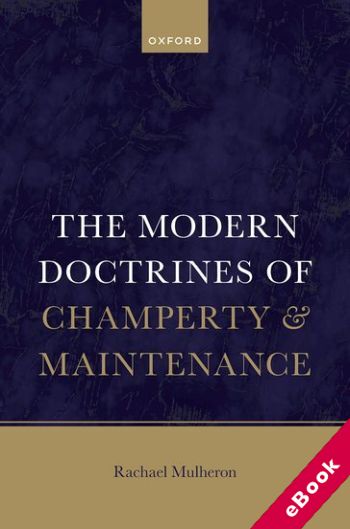
The device(s) you use to access the eBook content must be authorized with an Adobe ID before you download the product otherwise it will fail to register correctly.
For further information see https://www.wildy.com/ebook-formats
Once the order is confirmed an automated e-mail will be sent to you to allow you to download the eBook.
All eBooks are supplied firm sale and cannot be returned. If you believe there is a fault with your eBook then contact us on ebooks@wildy.com and we will help in resolving the issue. This does not affect your statutory rights.
As torts and as crimes, champerty and maintenance were abolished by statute in England and Wales in 1967. They were considered to be obsolete and the product of a bygone age, when abuses of the court system as practised by rich and powerful noblemen required a robust legal response. A modern, sophisticated, and independent judiciary rendered it unnecessary either to punish or to compensate for champerty or maintenance any longer. However, post-1967, their impact was retained via a 'reservation provision', which ensures that any contract tainted by champerty or maintenance 'is to be treated as contrary to public policy or otherwise illegal.' Fast forward five decades to the present day, and whilst maintenance has arguably reached its use-by date in English law, the same cannot be said of its more aggressive cousin. Champerty, as a doctrine, retains considerable modern impact in this jurisdiction, stalking the modern funding and civil procedure landscape. It continues to have greatest impact in two areas: the funding of litigation, and the assignments of causes of action.
The Modern Doctrines of Champerty and Maintenance looks comparatively at jurisdictions' attitudes towards champerty and maintenance, together with an analysis of law reform studies in the area, both in England and elsewhere.